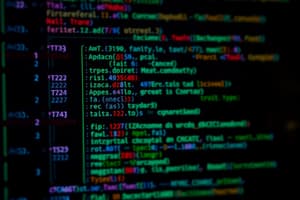Podcast
Questions and Answers
What can result from integer overflow in a software application?
What can result from integer overflow in a software application?
- Improved memory allocation
- Automatic type conversion safety
- Increased processing speed
- Buffer overflows and execution of arbitrary code (correct)
What is the range of a signed char in C++?
What is the range of a signed char in C++?
- -127 to 127
- 0 to 255
- -128 to 127 (correct)
- -255 to 255
Which statement is true regarding type conversions in C++?
Which statement is true regarding type conversions in C++?
- All type conversions guarantee safe memory space usage.
- Only signed types can be implicitly converted to unsigned types.
- An explicit cast is required for conversions that imply a different interpretation of value. (correct)
- Implicit conversions can include narrowing types without user intervention.
What is the maximum value that a signed int can hold in C++?
What is the maximum value that a signed int can hold in C++?
What is the primary reason for the failure of the Ariane 5 rocket during its maiden flight?
What is the primary reason for the failure of the Ariane 5 rocket during its maiden flight?
What could potentially happen when integer calculations exceed the finite limits of computer integers?
What could potentially happen when integer calculations exceed the finite limits of computer integers?
Which scenario correctly describes the behavior of signed and unsigned integers in C++?
Which scenario correctly describes the behavior of signed and unsigned integers in C++?
What is a potential performance implication when using data types of varying sizes in C++?
What is a potential performance implication when using data types of varying sizes in C++?
Which encoding method is specifically designed to represent a wider array of characters beyond ASCII in C++?
Which encoding method is specifically designed to represent a wider array of characters beyond ASCII in C++?
What is the primary reason for using data types in C++?
What is the primary reason for using data types in C++?
When using sizeof in C++, why should it not be applied to an array argument passed into a function?
When using sizeof in C++, why should it not be applied to an array argument passed into a function?
What happens to an integer value during an overflow in unsigned integers?
What happens to an integer value during an overflow in unsigned integers?
What is the typical range for a signed char in C++?
What is the typical range for a signed char in C++?
Which data type in C++ is used to represent Unicode characters?
Which data type in C++ is used to represent Unicode characters?
How many bytes does a short data type occupy in C++?
How many bytes does a short data type occupy in C++?
What is the maximum positive value that can be stored in an unsigned char?
What is the maximum positive value that can be stored in an unsigned char?
In UTF-8 encoding, how many bytes can a single character use?
In UTF-8 encoding, how many bytes can a single character use?
Which of the following statements about signed and unsigned integers is true?
Which of the following statements about signed and unsigned integers is true?
What happens during integer overflow in C++?
What happens during integer overflow in C++?
Which scenario would typically benefit from using an unsigned type in C++?
Which scenario would typically benefit from using an unsigned type in C++?
What is the typical size of an int data type in C++?
What is the typical size of an int data type in C++?
Which character set allows for the representation of a wider range of characters than ASCII?
Which character set allows for the representation of a wider range of characters than ASCII?
Flashcards
Computer Integers
Computer Integers
Finite set of numbers used by computers, unlike mathematical integers which are infinite.
Integer Overflow
Integer Overflow
Error that occurs when an arithmetic operation on integers produces a result that is too large or too small to be represented by the data type.
Signed Integers
Signed Integers
Integer data types that can represent both positive and negative values.
Unsigned Integers
Unsigned Integers
Signup and view all the flashcards
Data Type
Data Type
Signup and view all the flashcards
sizeof Operator
sizeof Operator
Signup and view all the flashcards
Integer Overflow Handling
Integer Overflow Handling
Signup and view all the flashcards
Signed vs. Unsigned Integers
Signed vs. Unsigned Integers
Signup and view all the flashcards
Why is Integer Overflow Dangerous?
Why is Integer Overflow Dangerous?
Signup and view all the flashcards
What is Type Casting?
What is Type Casting?
Signup and view all the flashcards
ASCII
ASCII
Signup and view all the flashcards
char Data Type
char Data Type
Signup and view all the flashcards
Unicode
Unicode
Signup and view all the flashcards
wchar_t Data Type
wchar_t Data Type
Signup and view all the flashcards
Signed Data Type
Signed Data Type
Signup and view all the flashcards
Unsigned Data Type
Unsigned Data Type
Signup and view all the flashcards
short Data Type
short Data Type
Signup and view all the flashcards
int Data Type
int Data Type
Signup and view all the flashcards
How many bits are in a byte?
How many bits are in a byte?
Signup and view all the flashcards
What's the difference between char and wchar_t?
What's the difference between char and wchar_t?
Signup and view all the flashcards
Study Notes
CSC 1029: Integral Data Types and Vulnerabilities
- Course focuses on integral data types in C/C++, including signed and unsigned integers
- Discusses how integral values are stored in memory using bits
- Explores integer overflow, its causes, and consequences for both signed and unsigned types
- Covers implicit and explicit type conversions, their impact on code
- Explains casting and issues that arise when mixing signed and unsigned data types
Objectives
- Learn the fundamentals of integral types in C/C++ (signed, unsigned)
- Understand how integral values are stored in memory
- Recognize integer overflow, its triggers, and potential consequences
- Explore conversions (implicit and explicit) affecting integral types
- Understand the role of casting for signed/unsigned type conversions
- Identify potential issues with combining signed/unsigned types
Agenda (Week 10)
- Computer Integers: Overview of integral types
- Fundamental Data Types: Basic types like char, wchar_t, short int etc.
- Integers: Signed and Unsigned: Differences between signed and unsigned representations
- Integer Overflow: What happens when values exceed bounds?
- Type Conversion: Converting between integral types
- Integral Vulnerabilities: Potential issues related to overflow, and conversions
- Data Type conversion functions: Functions for converting data types
- TODO list for the week
- Resources for additional help
Why Use Data Types in C++
- Data types inform the operating system about the handled data
- Appropriate memory allocation is determined by the data type
- Variables store data at designated memory locations
- Memory allocation for variables within a function is stack-based and type-dependent
Computer Integers
- Computer integers are finite, unlike their mathematical counterparts
- Overflow or underflow can occur; it depends on CPUs and languages
- Integer calculations outside the representable range can result in unexpected behaviors (carry/overflow flag)
- Exception handling, conversions, saturation, or wrap-around can be language- or hardware-specific
C++ Fundamental Data Types
- Table providing various C++ data types (char, short int, int, long int, bool, float, double, long double, wchar_t) along with their sizes and ranges.
Sizeof Operator
sizeofis a compile-time operator in C++ that determines the size (in bytes) of a variable or data typesizeofcan be used for sizing arrays (based on element count)- Pitfall: Do not use
sizeofon array arguments passed into functions
Char and Wchar
- ASCII table defines 128 character codes (7 bits)
- The first 32 are control codes (non-printable); the remaining 96 represent characters like digits, letters, and symbols
chardata type represents ASCII code- UTF-8 encoding (1-4 bytes) is used for characters outside ASCII
wchar_tdata type represents Unicode
Integral Memory Representation
- Shows the bit representation of integral data types (char, short, int)
Signed and Unsigned Types
- Every signed data type has an equivalent unsigned type
- Signed types represent positive and negative values
- Unsigned types represent only positive values (range starts from 0)
- Range for unsigned types is larger than signed types of the same bit size
Integer Overflow/Underflow
- Minimum and maximum values of data types depend on the method of representation (magnitude, sign bit, range etc.) and number of allocated bits
- Integer overflow/underflow happens when computations yield a value that's out of range for the corresponding data type
SEI CERT: Integer Wrap Prevention
- Recommendation INT30-C to avoid integer wrap-around which may lead to buffer overflows and arbitrary code execution
Integer Overflow (Discussion)
- Arithmetic overflow can cause crashes (e.g., Ariane 5 rocket failure due to steering software)
- Software relying on overflow checking and explicit type handling are considered less prone than those relying on implicit conversions
Type Conversions (C++)
- Implicit conversions occur when copying a value to a compatible type (same sign)
- Explicit conversions (type casting) are needed for conversions that might lose data or alter interpretation (e.g., different signs)
Data Type Conversion Functions
- Functions for converting
std::stringto integral types or vice-versa (e.g.,stoi,stol,to_string) - Avoid using non-standard
itoaorltoafunctions
Pre-Work and Week 10 Content Module
- Post weekly discussion questions and research solutions on D2L
- Complete Week 10 content module in D2L to achieve 100% completion.
Questions/Clarifications/Help
- Student office hours (appointment-based and drop-in)
- Email contact information for questions
- Online tutoring resources on D2L and RRCC website
Studying That Suits You
Use AI to generate personalized quizzes and flashcards to suit your learning preferences.
Related Documents
Description
This quiz covers integral data types in C/C++, focusing on signed and unsigned integers. You'll learn about memory storage, integer overflow, type conversions, and the implications of mixing signed and unsigned values. Test your knowledge on these critical concepts relevant to programming in C/C++.





